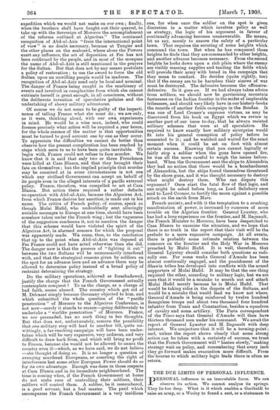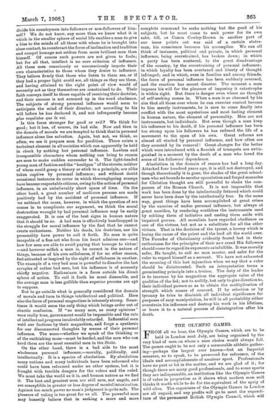THE DUE LIMITS OF PERSONAL INFLUENCE.
PERSONAL influence is an inscrutable force. We can observe its action. We cannot analyse its springs. They lie too deep. What is it which enables a Garibaldi to raise an army, or a Wesley to found a sect, or a statesman to
• divide his countrymen into followers or non-followers of him- self ? We do not know, any more than we know what it is which in the smaller sphere of social life enables a man to give a bias to the minds of all those with whom he is brought into close contact, to counteract the force of inclination and tradition and compel homage not seldom from more brilliant men than himself. Of course such powers are not given to fools; but for all that, intellect is no sure criterion of influence. All these men consciously or unconsciously impute their own characteristics to those whom they desire to influence. They believe firmly that those who listen to them see, or if they had a proper light could see, all things as they see them, and having attained to the right point of view would of necessity act as they themselves are constrained to do. Their faith conveys itself to those capable of receiving their doctrine, and their success is not summed up in the word obedience. The subjects of strong personal influence would seem to anticipate the mind of their director, act according to his will before he has declared it, and not infrequently become plus royalistes que is roi.
' Is this force stronger for good or evil P We think for good; but it has, of course, its bad side. Now and then in the domain of morals we are tempted to think that in personal influence alone lies salvation. Again, but not, we think, so often, we see it prepare men for perdition. There exists a turbulent element in all societies which can apparently be held in check by nothing but personal influence. Lawless and irresponsible characters whom nothing can bring to reason are seen to make sudden surrender to it. The light-headed young man of fashion and the " hooligan " of the streets, neither of whom could grasp a theory or stick to a principle, are alike taken captive by personal influence; and without doubt occasional instances do occur in which thoroughgoing scamps have become respectable citizens, owing to the action of personal influence, in an unbelievably short space of time. On the other hand, a great number of mediocre persons are made positively bad by the accident of personal influence. If we subtract the cases, however, in which the question of sex comes in to complicate our argument, we think the moral destruction wrought by bad personal influence may be easily exaggerated. It is one of the best signs in human nature that it should be so. A bad man is effectively handicapped in the struggle for moral influence by the fact that he cannot create enthusiasm. Neither his deeds, his doctrines, nor his personality have power to call it forth. No man is quite incapable of a fine act who from his heart admires one—and bow few men are able to avoid paying that homage to virtue! —and however selfish a man is, he cannot in the nature of things, because of his own selfishness, if for no other reason, feel attracted or inspired by the sight of selfishness in another.
The example of a very bad man is powerful to dissolve the last scruples of rather bad men, but his influence is of necessity chiefly negative. Enthusiasm is a force outside his direct sphere of action. To call it forth he must dissemble, and the average man is less gullible than superior persons are apt to suppose.
But to go outside what is generally considered the domain of morals and turn to things intellectual and political. Here also the force of personal magnetism is intensely strong. Some-
times it, would seem the only thing which brings order out of chaotic confusion. If "so many men, so many opinions" were really true, government would be impossible and the rate of intellectual progress incalculably retarded. Influential men weld our factions by their magnetism, and forge a synthesis for •our disconnected thoughts by means of their personal influence. The mass—whether we speak of the thinking or of the unthinking mass—must be herded, and the men who can herd them are the most essential men in the State.
On the• other band, there is a bad side to the most
wholesome personal influence,—morally, politically, and intellectually. It is a species of absolutism. By absolutism many nations and many individuals have been reformed who could have been reformed under no other system, but it is fraught with terrible dangers for the rulers and the ruled. We must take the world as it is, and human nature as we find it. The best and greatest men are still men, not angels, and are susceptible in greater or less degree of mental intoxication. Against too much power no man's judgment is quite safe. The pleasure of ruling is too great for us all. The powerful man may honestly believe that in seeking a more and more complete command be seeks nothing but the good of his subjects, but he must come to seek power for its own sake, till, as Canon Cowley-Brown in another part of our issue points out was said of a certain states. man, his conscience becomes his accomplice. We can all think of instances, political and private, in which persoual influence, being overstrained, has broken down ; in which a party has been scattered, to the great disadvantage of the country, by the overstraining of personal influence; in which loyalty has been overtaxed and liberty of thought infringed; and in which, even in families and among friends, the force of personal influence has been suddenly reversed, and the reaction has meant disaster. The moment a man imposes his will for the pleasure of imposing it catastrophe is within sight. But there is danger even where no thought of self-seeking comes in. When a man is so obsessed by his aim that all those over whom he can exercise control become to him merely instruments, he is sure to come finally into conflict with the most mysterious and most lasting element in human nature, the element of personality. Men are not instruments, but individuals. But even though a man keep his influence to his death, if his personal influence has been too strong upon his followers he has reduced the life of a movement to the span of his own. Great reforms are almost all started by personal influence, and how often are they arrested by its removal ! Great changes for the better which were introduced with a flourish of trumpets are extin- guished in a moment by the death of a man who loved the sense of his followers' dependence.
Absolutism in the domain of reason has had a long day. Attacked four hundred years ago, it is still not destroyed, and though theoretically it is gone, the shades of the great school- men who set bounds to secular speculation and forged manacles for Christian thought are still powerful to shake the com- posure of the Roman Church. It is not impossible that work has been done by the intellectually fettered which could never have been done by the intellectually free. In the same way, great things have been accomplished at great crises by the exercise of undue personal influence, but always at great sacrifice, by rendering worthless the instruments used by robbing them of initiative and casting them aside with impaired powers. All moralists have regarded obedience as one of the virtues, but not as a substitute for all the other virtues. That is the doctrine of the tyrant, a heresy which is losing the cause of the priest and the lord all the world over. The Founder of Christianity evidently feared lest in their enthusiasm for the principles of their new creed His followers should come to regard its exponents as infallible. It was morally safer, He taught, to call no man master, and safer for the ruler to regard himself as a servant. Wo have not exhausted the meaning of this last injunction when we say that a ruler should be disinterested. Such an interpretation turns a germinating principle into a truism. The duty of the leader is to increase by his magnetism the aggregate value of the qualities of the led; not to nullify, but only to give direction to, their individual powers so as to obtain the multiplication of strength which comes of concord. If by selection or by tyranny he tries to diminish all individual significance for purposes of easy manipulation, he will in all probability either overstrain his influence and destroy his work in his lifetime, or leave it to a natural process of disintegration after his death.















































 Previous page
Previous page